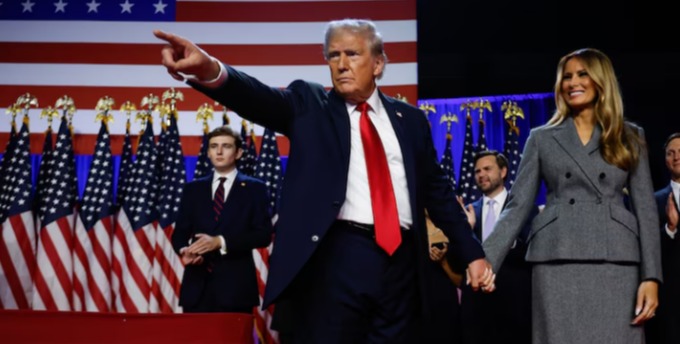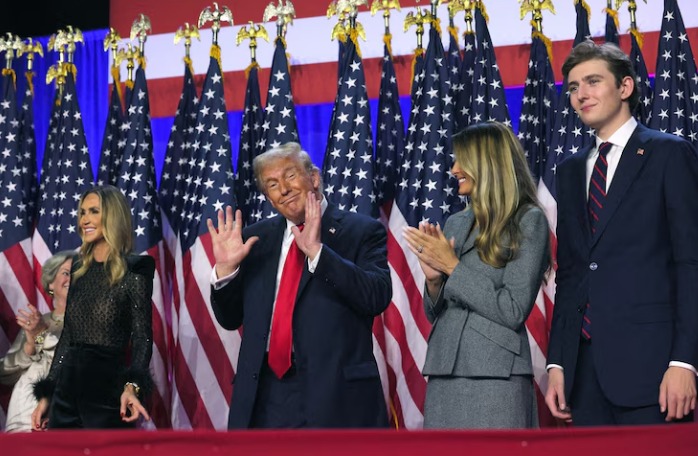Why Trump Had to Become President in 2024
As the 2024 presidential election approaches, Donald Trump’s return to the political forefront has sparked widespread discussion and analysis. With a strong base of support and a unique political strategy, many believe that Trump is not just a contender but a likely candidate for the presidency. In this post, we will explore the reasons why Trump had to become president in 2024, examining various political, economic, and social factors that contribute to his compelling narrative.
Unwavering Support Base
One of the most significant factors in Trump’s potential success is his unwavering support base. Since his first campaign in 2016, Trump has cultivated a dedicated following that remains loyal despite controversies and challenges. This base consists of a mix of working-class individuals, conservatives, and those disillusioned with traditional politics.
Political Loyalty
Trump’s supporters exhibit a high degree of political loyalty, often viewing him as a symbol of resistance against the established political elite. This loyalty translates into grassroots mobilization, making it easier for him to rally support during election campaigns. His ability to connect with voters through direct communication, often via social media, reinforces this loyalty.
Economic Accomplishments
Trump’s presidency was marked by notable economic achievements, including tax cuts and deregulation, which many supporters credit for stimulating economic growth. As the nation navigates post-pandemic recovery, voters may look back fondly on his economic policies.
Job Growth and Stock Market Performance
During Trump’s tenure, the U.S. saw significant job growth and a booming stock market. These economic indicators, coupled with his promises to revive American manufacturing and create jobs, resonate with voters who prioritize economic stability and growth.
The Current Political Landscape
The political landscape leading into the 2024 election is characterized by division and polarization. Trump’s narrative of being an outsider who challenges the status quo appeals to voters frustrated with traditional political dynamics.
Democratic Party Challenges
The Democratic Party faces internal divisions and challenges, particularly regarding leadership and policy direction. President Biden’s approval ratings have fluctuated, and key issues such as inflation and foreign policy have created discontent among voters. This environment presents an opportunity for Trump to position himself as the strong alternative.
Media Influence and Public Perception
Trump’s relationship with the media is complex but impactful. He has mastered the art of using media coverage to his advantage, often dominating headlines and public discourse. Despite negative portrayals, this constant media presence keeps him relevant and in the minds of voters.
Controversy as a Tool
Trump’s controversial statements and actions often lead to extensive media coverage, which can serve as free publicity. While critics may argue that this harms his image, many of his supporters view it as evidence of his authenticity and willingness to speak his mind.
Foreign Policy Stance
Trump’s foreign policy approach, characterized by an “America First” philosophy, resonates with many voters who prioritize national sovereignty and security. His administration’s focus on renegotiating trade deals and addressing immigration has garnered support from those who feel overlooked by previous administrations.
Relations with China
Trump’s tough stance on China, particularly regarding trade and intellectual property theft, appeals to a significant portion of the electorate concerned about economic competition and national security. This position reinforces his image as a strong leader willing to confront foreign adversaries.

Social Issues and Cultural Dynamics
Trump has adeptly tapped into cultural and social issues that resonate with his base. Topics such as immigration, law and order, and Second Amendment rights are central to his platform and attract voters who feel their values are under threat.
Law and Order Messaging
In recent years, issues surrounding crime and public safety have gained prominence. Trump’s emphasis on law and order, particularly in response to civil unrest, appeals to voters seeking stability and security in their communities.
Campaign Strategies
As the election cycle unfolds, Trump’s campaign strategies will play a crucial role in his potential success. His ability to rally support through large-scale rallies, targeted messaging, and grassroots mobilization will be essential.
Digital Campaigning
Trump’s savvy use of digital platforms to engage with voters directly allows him to bypass traditional media filters. This approach enables him to communicate his message effectively and mobilize supporters quickly.
The Role of Key Endorsements
Endorsements play a critical role in shaping public perception and can significantly impact a candidate’s campaign. Trump has managed to secure endorsements from influential figures and organizations, which bolster his credibility and appeal among undecided voters.
Support from Prominent Republicans
Trump has received backing from several high-profile Republican leaders and former officials, reinforcing his status as the frontrunner for the party’s nomination. These endorsements not only lend him political capital but also help to unify the party around his candidacy, making it more challenging for any rival candidates to gain traction.
The Appeal of Outsider Status
Trump’s identity as a political outsider continues to resonate with many voters who are disillusioned with traditional politicians. His unconventional approach to governance and communication sets him apart from typical candidates, and many see this as a refreshing change.
Anti-Establishment Sentiment
The growing anti-establishment sentiment among voters is a critical factor in Trump’s appeal. Many Americans feel that the political elite has failed to address their concerns. Trump’s narrative of being a champion for the “forgotten” citizens positions him as a viable alternative to the status quo.
Addressing Voter Concerns
Trump has a unique ability to address the concerns of various voter demographics. By tailoring his message to resonate with specific groups, he can broaden his support base.
Focusing on Working-Class Issues
Trump’s focus on issues affecting the working class, such as job security and fair wages, has proven effective. His promises to revitalize American manufacturing and bring jobs back to the U.S. appeal to voters who feel left behind by globalization.
The Impact of Social Media
Social media remains a powerful tool for political campaigns, and Trump’s adept use of these platforms helps him engage with voters directly. His presence on platforms like Twitter (now X) and Instagram allows him to communicate his messages quickly and effectively.
Bypassing Traditional Media
By leveraging social media, Trump can bypass traditional media narratives that may be unfavorable. This direct line of communication enables him to shape public perception and rally support without the filter of mainstream media.
Resilience in the Face of Adversity
Throughout his political career, Trump has faced numerous challenges, including impeachment and legal issues. His resilience in overcoming these obstacles has endeared him to supporters who admire his tenacity.
Turning Challenges into Opportunities
Trump has a knack for turning challenges into opportunities to rally his base. By framing legal challenges as politically motivated attacks, he can galvanize support and portray himself as a victim of the establishment.
Future Policy Proposals
As Trump campaigns for the presidency, he is likely to present bold policy proposals that resonate with his base. These proposals will be crucial in differentiating him from potential opponents and reinforcing his platform.
Economic Recovery Plans
Trump’s proposed economic recovery plans will likely focus on tax cuts, deregulation, and infrastructure investment. By emphasizing these issues, he can appeal to voters looking for tangible solutions to economic challenges.
Conclusion
The convergence of support from key endorsements, outsider appeal, targeted messaging, and effective use of social media positions Donald Trump as a formidable candidate for the 2024 presidency. His ability to navigate challenges and present compelling policy proposals further strengthens his case. As the election approaches, the dynamics of the political landscape will continue to evolve, making it essential to monitor how these factors influence voter sentiment.
